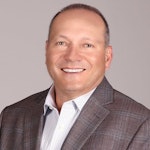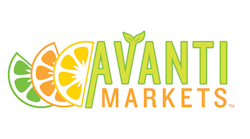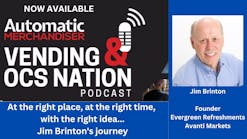Podcast: Keeping the micro market concept fresh — Insights from Jim Brinton
There is no coasting for Jim Brinton. Even after selling Avanti to 365 Retail Markets, Brinton loves to see his businesses grow. It clearly drives him.
In this episode of Automatic Merchandiser’s Vending & OCS Nation, the podcast for the convenience services industry, it’s part two of our interview with Jim Brinton.
Key takeaways from Jim Brinton's 50+ years in convenience services
Keeping micro markets fresh and engaging remains a top priority to maintain customer interest.
- Often called the “grandfather of micro markets,” Jim Brinton was key to the convenience industry's embrace of micro markets, but he doesn’t claim to be the sole inventor.
- Initially, Brinton believed micro markets were all the convenience services industry needed. Regulatory changes and shifting consumer expectations led to innovations such as locking coolers and combination freezer-coolers.
- Today, Brinton says the smart market concept is the future of micro markets, providing a more secure yet accessible shopping experience.
- Brinton warns new entrants to the vending industry about the risks of undercapitalization, using his own early experience to illustrate.
- People and relationships matter in this industry. The key to sustaining a successful business is continuously hiring and developing the right people while adapting to industry changes.
- Looking to 2025 and beyond, Jim Brinton is optimistic about the convenience services industry, believing that technological advancements will help address labor shortages and improve operational efficiency.
Listen now
Brinton is a humble man, but he is proud of the success he has achieved through hard work, innovation and risk-taking. He talks about the importance of keeping the micro market concept fresh, the key people who have helped him succeed, critical advice for new operators, his outlook for 2025 and of course, his secret sauce recipe — a work in progress.
Mentioned in this podcast episode:
- Due North
- National Automatic Merchandising Association (NAMA)
- Unified Strategies Group
- Kevin Brinton from Evergreen Refreshments
- Craig Kushner of Monumental Vending Inc.
- Barry Rosenberg of Vending One Inc.
- Aaron Speagle formerly of Breakroom Provisions
- Scott Phillips of Avanti Markets and 365 Retail Markets
- Elyssa Steiner of Cantaloupe Inc.
- Chris McCormack of Avanti Markets
- Arthur Siller from Evergreen Refreshments
- Vistar
- Mark Dieffenbach from The Hershey Co.
No time to listen? Prefer to read? Here is an edited podcast transcript:
Bob Tullio: So, you had a vision, obviously, in 2009, maybe 2008, for what the micro market business was going to look like. How did that vision evolve and change to today?
Jim Brinton: Yeah, that’s great question again. What’s the old saying? You don’t know what you don’t know?
Because I’ve just allowed them to take what was locked up inside a cabinet, say, let’s look at snacks for a second, 35 SKUs of snacks in a locked-up cabinet. And now — all of a sudden — they can offer their customers 150 SKUs of snacks in an open-market environment. And I thought, “This is all that we’re ever going to need.”
But quickly thereafter came regulations — the government started coming into place. That’s why I immediately went to cooler companies and said, “Hey, you need to develop. This industry is going to need a locking cooler, so that if temperatures get out of whack — things like that happen — we preserve that food so that it’s in a safe environment.”
Soon after that is when I went to Minus 40 [now Due North] and said, “Maybe in a lot of locations where we’re now offering food, we don’t need as much [fresh] food as we thought. So how about a combination freezer cooler?” So, they developed that for me, and the industry had a ton of success at it.
Probably the thing that’s kept me up at night the most — and that’s concerned me the most — is, “Okay, we developed this cool new concept that we were able to bring to the market. How are we going to keep this fresh?”
The driving factor, whether it was in vending or in micro markets, was always led by food. And what I’ve always said is that I took vending — or micro markets took vending — from being kind of a destination of last resort, to really being a destination. How do I keep it a destination?
And what I mean there is: Even if I gave you a voucher and said, “Bob, pick the restaurant you want to eat at it and you can eat there every day for free for the rest of your life.” How often and how long would you go there? Probably not very often because they just don’t change their menu enough. I get tired of the food, even though it’s the best there is. That’s what concerned me about the micro market space: How do we keep these markets fresh? Do we need to bring in external food sources, whether restaurants, fast casuals, so that our customers out there don’t look back and kind of say, “Well, we love that market back in 2010, but it’s kind of become just the same food every week in and week out and so forth.”
No, we want them to come to that market and think that it’s going to be a different experience, at least changing from time to time, so that they don’t lose interest in this cool new concept that we’ve brought to them.
Bob Tullio: Is it safe to say that you are the inventor of the micro market?
Jim Brinton: Well, I don’t know. I’ve had people coin the thing, saying, “Hey, he’s the grandfather of micro markets.”
I don’t think that I was the inventor of micro market. I created an opportunity of taking a different way to sell retail products in our locations. I basically didn’t really invent anything, Bob. I created a marketing and a technology company that bettered the opportunities that we had available to their customers. There were many other people who were involved in this same space about the same time. I was probably just the most noisy.
Bob Tullio: You certainly did a lot of the parenting, the nurturing, and the raising of it, that’s for sure.
Jim Brinton: Yes. I was in a space…chairman of NAMA in 2008, and then I had to be chairman again in 2009 because of the economy. So, I was in a position of notoriety. I was president of the USG at the time and had been instrumental at helping bring together two or three buying co-ops.
So, I had an audience. In this country, there's probably been an awful lot of other cool things like micro markets that had been invented and never were able to get legs because the person who did the invention — the person who was the brainchild behind it — just didn’t have the proper mechanism to get it to market.
I was really, really lucky that I did. And, you know, I put in many, many hours of free labor for NAMA and never expected... I wasn't thinking like, “Hey, this is going to be payback someday when I launch this, and I have a lot of friends in the industry.” It’s just like Thomas Edison says, “Sometimes the harder I work, the luckier I get.” Well, not necessarily been a hard worker, but it takes a little luck sometimes to be at the right place at the right time. And I was the beneficiary of that scenario.
Bob Tullio: I love that answer. That’s a good one. But I have to ask you a question about another cool product, and that’s the smart market concept — the whole smart market. How do you feel about the smart market?
Jim Brinton: It’s going to be our next leg for this industry. We found a better mousetrap, a better way to bring products to the consumer, taking it from behind the glass, allowing them to touch it, feel it. The security aspect of traditional micro markets has been kind of the unknown. And as this has matured, and we’ve tried to test more and more waters to make the micro market concept continue to explode, we found that not every location is great or provides enough of a secured environment to be able to make micro markets successful. So, the smart market is going to be the thing that will help us bridge that gap from being in an environment that still presents the opportunity for the customer to touch and hold the product before buying it, with the more secured technology piece of the smart market.
Take a deeper dive
- Jim Brinton assumes majority ownership of Avanti Markets; former partners form new self-checkout market system, Breakroom Provisions Co.
- VendingMarketWatch News: First steps to selling the micro market concept (video)
- 3 secrets to better micro market service
- Avanti operator meeting hit record attendance of over 190 attendees
- Avanti Markets acquires BYNDL, a mobile transaction service provider (video)
Bob Tullio: Do you have any family working in the business?
Jim Brinton: I do. You know, way back when, it’s kind of funny — this is a kind of an old story, but I’ll make it really short.
As I told you earlier in the interview, I bought this can soda machine that was made for steel cans, not for aluminum cans. Soon after, my three brothers all sat around the dinner table with me, and said, “If you asked what is the last business out there that I’d ever want to be in, it would be vending.” About five years later, all three of them were working for me in the business. They’ve since either retired or moved on to other things.
And so, I’ve been kind of on my own in this for a number of years, but my son Kevin graduated from college with a degree in finance. He made the decision that he was going to test the waters in the convenience services business. He spent six weeks with Monumental Vending — getting kind of a little MBA in the business — testing every different segment of the business with Craig Kushner. And at the end of that, he decided to say, “Dad, I would like to enter the business.” And so now, he’s actively working for us in the business, heading up one of our operational teams in the Northwest.
It not only kind of gave me another shot in the arm of adrenaline to say, “Hey, let’s really work hard and continue to develop this business,” but it’ll give me — hopefully — an exit plan down the road.
Bob Tullio: You know, Barry Rosenberg once told me — he’s an operator out of LA — that he thinks vending is in people’s DNA. There’s just no way to get rid of it once you have it. You agree with that?
Jim Brinton: I do agree with it. I think the people in this industry have a certain DNA that makes them special in their own way of wanting to have a mixture between the entrepreneur side and serving others. That’s exactly what we do in this business.
Bob Tullio: Is there anything over the years that, as a company, you look back and say, “I took a wrong turn, but we were able to correct it”?
Jim Brinton: Sure. I would say I got very distracted early on in this business. I started in traditional vending and then, in my early years, when I was still in my teens, I got involved in concessions. I got involved in owning some small restaurant food-service operations. I got involved in a disco that turned into a nightclub, and so forth.
And I looked back on all these things and said, “What is supporting all this?” And it was my vending business. And then I realized the reason it was so important that my vending business was supporting that is: This is a capital-intensive business, and you have to control your cash.
Early on, I’d made some mistakes. When interest rates were as high as 22 to 23% in the early 1980s, I wasn’t saying “no.” The equipment people were financing me, and selling equipment to me, and so forth, and saying, “Hey, wonderful that you continue to grow your business.” But I didn’t really quite understand the economics on that side of it: To support those types of high interest rates, something was going to have to suffer. And my business almost did, by not having enough cash to pay all the bills.
I weathered the storm — got through it — but I learned a very valuable lesson there.
Bob Tullio: There are a lot of new entrants coming into the business. A lot of people are excited by the technology. What’s the best lesson that you can give to them? What advice can you give to those folks as they start a business in convenience?
Jim Brinton: It’s really simple on that: Most people are going to have way more enthusiasm than they likely do cash. And the problem is, the reason most businesses in this industry end up failing: They’re undercapitalized.
Before you get into this industry, and before they make that plunge, they need to have a full runway of what their expectations are and where they really need to get to, whether it’s a sales number or a profit number, so that they know.
And likely — if they haven’t done their homework — what’s going to happen is before they can get to one of those two numbers, they’re going to be starved capital-wise. And no matter what they do or how much enthusiasm they have, it just is a governing effect. They’ll lose interest and, unfortunately, many times, lose their business.
Take a deeper dive
- Operation Profile: Seattle visionary ushers in new vending era with micro markets
- Avanti Markets announces 10th anniversary celebration as part of operators meeting
- Micro market leaders 365 and Avanti confirm anticipated merger
- Video: We are ONE: 365 and Avanti Merge, from 365 Retail Markets
- 365 Retail Markets CEO sees exceptional growth opportunities with Avanti merger, LightSpeed Automation acquisition
Bob Tullio: Under capitalization is the problem out there, it seems. Are there any key people in your organization, past or present, that you want to acknowledge?
Jim Brinton: Wow. Let’s kind of parse it out in a couple of different ways.
First, Avanti Markets, which obviously has been kind of my golden child there.
Aaron Speagle, who was really the one who helped me put together the background and the foundation of what a micro market kind of needed to look like, and was willing to step aside and get out of the way and let me run with it.
When I started Avanti, Scott Phillips was my very first employee. He was out there doing every little bit of it and is still involved with the company today.
And then came some of the people who helped me build Avanti. That’s Elyssa Alliar — which is Elyssa Steiner now — was instrumental in helping me build the business. Followed by John Riley, who was our president, to my CFO Chris McCormack, who was so instrumental in helping such a complex company at the time of the merger, getting it ready for that. So those are all really important people.
Next, on my Evergreen Refreshments side. Obviously, my brothers — at one point or another — all were instrumental in helping me grow the business. And then most recently, as I told you, I’m glad to have my son Kevin involved in it.
Arthur Siller came along at a very important time in my business of Evergreen. That allowed me to continue to put focus on Avanti Markets while he helped over on the operational side.
Bob Tullio: Arthur did a good job for us. I got to tell you that.
Jim Brinton: Yeah, he’s a great guy, and his heart’s in the right place for sure.
Bob Tullio: How about from a supplier standpoint? Any suppliers you want to recognize either on the technology or on the non-technology side who have helped things move forward for both Evergreen and for Avanti?
Jim Brinton: The most important supplier, I think, in this industry has been Vistar. If they hadn’t been there to recognize the opportunity — and, hey, I’m not at all afraid or ashamed of the fact that this has been a self-rewarding prophecy for both of us. But, if they hadn’t been able to break down the silos of products and supply chains, and so forth, it would have been much tougher for the micro markets to expand their offerings and so forth.
And then I’ve got the other people from the manufacturers’ side. Mark Diffenbach at Hershey’s, to Mars and so forth — that were just there at the right time, so the others would follow. There are just so many, I could go on and on and on, but those are some of the most important.
Bob Tullio: How many employees total at Brinton Business Ventures, roughly?
Jim Brinton: As of today, just under 400. You ask me in another couple of weeks, and that’ll increase by quite a bit as we’re getting ready to acquire a couple of operations to add to our family of businesses.
Bob Tullio: So, are you still having fun in this business?
Jim Brinton: I am. I wouldn’t say every day is that way, but I don’t know any business that’s that way. But for the most part, I really am. As I said, it’s given me a little bit more fun knowing that potentially Kevin, who will be able to take this company as the next generation and beyond.
Bob Tullio: How do you feel about 2025 and the future of the industry itself?
Jim Brinton: I feel strong about it. I think that technology is going to help bridge some of our problems right now. Our problems are really people problems — that’s just not having, or being able to find, enough staff that want to maintain full-time regular jobs. Technology will help solve some of those problems to take a little pressure off.
Continued innovation and some technology advancements as we talked about in smart markets and beyond. We’re going to be able to stand out. I think that there will be continued breakdowns of silos that separated our industry at one time or another.
Bob Tullio: How important is giving back, and how does philanthropy fit into the structure of Brinton Business Ventures?
Jim Brinton: It’s always been really important to us. It is something we’re thinking about. Matter of fact, I just had a call this morning with my team talking exactly about that, saying like, “We’ve got to make sure that any food that we can, that we pull from markets that still has sellable date, usable dates on them, is donated properly and is used by someone out there.”
I don’t know if you know it, but I spent 10 years of my life, from age 25 to 35, on the Seattle police force, so law enforcement is an important part of my life. So, I support a lot of different causes around fallen police officers and so forth, their families and that. It’s really important. And I think it’ll become more and more important as I continue to kind of age out and have the opportunities to be even more involved in some of these things.
Bob Tullio: What is the secret sauce at Evergreen, and at Avanti, for that matter?
Jim Brinton: Having the right people in the right seats of the bus.
Believe me, I wouldn’t say that we’ve necessarily found that secret sauce. Some days I think we have it. Some days I go there, and the jar’s empty. It’s a work in progress. And I just think like, if you ever quit trying and growing in the people side, you’re going to fail. And everything else we do is kind of a commodity. We still serve people, and we have to have people with good attitudes and train up from there.
Bob Tullio: You’ve been recognized with numerous industry awards. What does that mean to you?
Jim Brinton: It means an awful lot, Bob. I appreciate you bringing that up. It’s nice to know that after all these years, someone out there has recognized it, and hopefully they’re recognizing it because I’ve made a difference in their life or their business. And if I did, hey, that’s the warm and fuzzy feeling. The award sits on the shelf, but I get to live with that warm and fuzzy feeling like, “I made a difference in someone’s life, in someone’s business day in and day out.”
Bob Tullio: Well, there’s no question you’ve made an impact on the industry. What’s next?
Jim Brinton: What would I like next, or what would my wife like next? I don’t see any necessarily immediate slowing down. I think that I want to continue to grow. I’ve had this old saying, and Arthur could probably tell you that in my office, is “If you’re not growing, you’re coasting. And if you’re coasting, it means you’re going downhill.”
So I am one of those who always feels like I need to be growing, both in business and personally. I continue to love to grow businesses and see people flourish and businesses flourish. And until that desire goes away, probably not going to see an awful lot of change.

Bob Tullio
Bob Tullio is a content specialist, speaker, sales trainer, consultant and contributing editor of Automatic Merchandiser and VendingMarketWatch.com. He advises entrepreneurs on how to build a successful business from the ground up. He specializes in helping suppliers connect with operators in the convenience services industry — coffee service, vending, micro markets and pantry service specifically. He can be reached at 818-261-1758 and [email protected]. Tullio welcomes your feedback.
Subscribe to Automatic Merchandiser’s new podcast, Vending & OCS Nation, which Tullio hosts. Each episode is designed to make your business more profitable.







